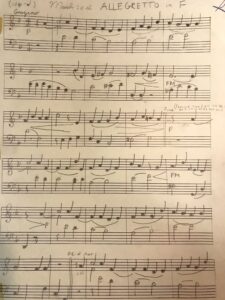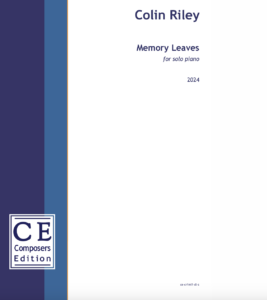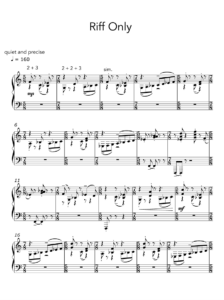Until about the age of seventeen I was saturated in classical music. I couldn’t get enough of it.
I had piano lessons, cello lessons. I joined the local youth orchestras and played in amateur orchestras. My parents took me to the Halle orchestral concerts at the Free Trade Hall and I went to as many chamber concerts as I could. It felt totally natural at the age of 14 to form a string quartet, and then a chamber orchestra. I consumed all biographies of the ‘great’ composers that were in the library. I listened to as many new records as I could each week, reading all the sleeve notes from cover to cover. I would take out large bundles of LPs every week from all the local libraries in the area. Ideally these would be box sets, (which might contain several records), and would keep me in listening for the next few days.
Through all this I was also composing. I had grand plans. I would start a symphony, or a ballet, but not really know what to do. I wrote for people I knew, forcing them to play the barely-legible scribblings. I moved quickly from one piece to the next. And I wrote lots and lots at the piano.
As a teenager I spent many Saturday afternoons in Forsyths, a music shop in the centre of Manchester. This would be followed by the Henry Watson Music library, taking out scores and chamber music parts. Then maybe back to Forsyths to try out one of their grand pianos and dream.
It was in Forsyths that I would linger in the corner where the manuscript paper was on their bottom floor section along with all the sheet music. It came in all shapes and sizes and provided a sense of endless possibilities; a blank canvas. Buying it was almost a kind of ritual. Through buying a pad of the paper I was committing to the idea of being a composer; entering a pact to fill these pages with something.
I’d been filling manuscript paper with dots since I was 7 or 8, and returning periodically back to Forsyths to stock up on more empty pages. Composing always stemmed from wrong notes stumbling out from my regular practice. These notes seemed to spark something off, providing the seed of an idea. I would mess around until I’d fashioned a small piece of music. It seemed totally natural to then want to write this down. The top of my piano has never been without tattered sheets of manuscript paper mixed up amongst the regular sheet music, along with several pencils, a rubber and a pencil sharpener.
My first piece was Allegro in F.

As with all my very early attempts, they imitated the music I was listening to at the time. Bits of Bach and Handel, Mozart and Beethoven. As well as these obvious influences I quickly became more and more attracted to the last piece in the ABRSM exams, the ‘modern’ one, and so my compositions got tinged with increasing amounts of dissonance and angularity. This peaked when I was about 16 with pieces using 12-tone techniques and then total serialism.
My onward creative journey from there seems to have been one in which I’ve tried to blend things more subtly. What has remained the same is my attraction to hand-shapes, and allowing these to craft something simple, but interesting.
My latest piece is Memory Leaves.

In many ways the process has been the same in most of my piano pieces. Me collecting moods and hand patterns and writing them down. Over the years I’ve composed in many different ways (using improvisation, systems, software, and even AI), and for a huge range of mediums (voices, electronic instruments, larger and small groups), but the relationship between me and the piano is strong. I just love the tactility of creating at the piano. I enjoy pattern-making, and feeling these patterns. I also keep returning to the format of a collection of short pieces. As a beginner I remember fondly one of my first books was Walter Carrol’s Scenes at a Farm. This would almost certainly have been bought for me from Forsyths. Later I enjoyed Schumann’s Scenes From Childhood, Grieg’s Lyric Pieces, and later on the amazing Ligeti Etudes.
On Friday 24th January Memory Leaves will be premiered by the RNCM’s head of keyboard Adam Swayne and some of his wonderful students. The concert will take place in Forsyths music shop.

So, 5o years on I return to Forsyth’s. I’m pretty sure I will linger for a while on the ground floor to touch in with the manuscript paper and soak up the memories, but my journey will lead me upwards to the top floor where all the pianos are and where the concert takes place. As always, it will be a huge privilege to hear my music played live, and this premiere will be particularly special, performed as it will be by a selection of superb young musicians.
Memory Leaves is premiered at 6.30pm on Friday 24th January in Forsyths Music Shop, Deansgate, Manchester by Adam Swayne and pianists from the RBCM.